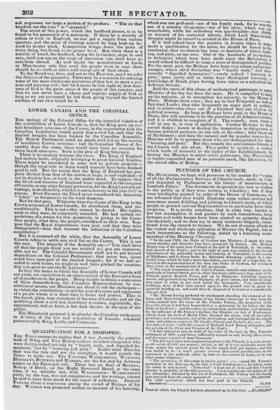LOWER CANADA AND THE COLONIAL OFFICE.
THE apology of the Colonial Office for the intended violation of the constitution of Lower Canada is, that the King gave up cer- tain hereditary revenues of the Crown, in the expectation that the Canadian Legislature would grant him a civil list, and that the implied bargain has been broken by the Canadian Assembly. The British Parliament voted an ample civil list on the cession of hereditary Crown revenues : had the Canadian House of As- sembly done the same, there would have been no occasion for these harsh measures. Such is the plea of King STEPHEN. There is no analogy between the cases. The King of England bad certain lands, originally belonging to great baronial fatuities. These might be considered in sotr.e sort as private property— though the royal title to them would scarcely have been deemed good to sell. But the notion that the King of England has pro- perty distinct from that of the nation at large, is now exploded—if not in obsolete law, at least in the public mind. To suppose that the blood and treasure of England were expended in the conquest of Canada, or any other foreign possession, for the King's private ad- vantage, is an absurdity, which it is not necessary in the year 1837 to expose. Even GEORGE the Third never considered the American " rebels" as trespassers on his royal demesne.
But let that pass. Whatever were the claims of the King to the Crown revenues of Lower Canada, he abandoned them, and un- conditionally. This is not—this cannot be denied. His rights, such as they were, he voluntarily conceded. He had certain ex- pectations of a return for this generosity in giving to the Cana- dian people, what they, the people, considered as their own. Sup- pose that the Royal expectations were just, and that they were disappointed—does that warrant the infraction of the Canadian constitution ?
But it is assumed all the while, that the Assembly of Lower Canada refuse to settle any civil list on the Crown. This is not the case. The majority of the Assembly say—" You shall have all that the people think you are entitled to; you are unreason- able, not we. The Colonial Government shall not be put beyond dependence on the Colonial Parliament: that never was, never could have been part of the implied bargain ; for if we had ac- ceded to such terms, a e might as well have pitched the constitu- tion you gave us into the St. Lawrence."
In fact, the terms to which the Assembly of Lower Canada will not yield, are equivalent to an emancipation of the Executive from all dependence on the people. Being unable toobtain a concession of these demands from the Canadian Representatives by con- stitutional means, our Ministers are about to rob the exchequer— to violate the constitution—to act the part of tyrants and oppressors of a people whom it is their duty to foster and protect. This is the broad, plain, true statement of the case of Canada; and all the quibbling about a civil list, hereditary revenues, ingratitude, dis- appointment, and so forth, is but dust thrown in the eyes of the public.
The Ministerial proposal is to plunder the Canadian exchequer, in defiance of the law and constitution of Canada, solemnly guaranteed by King, Lords, and Commons.


























 Previous page
Previous page